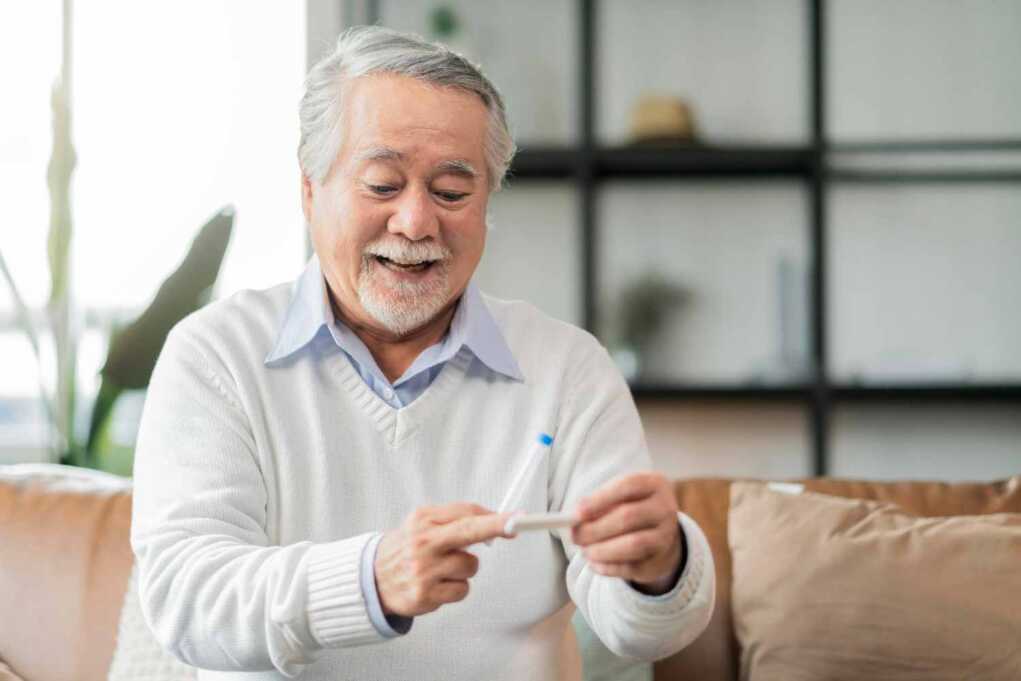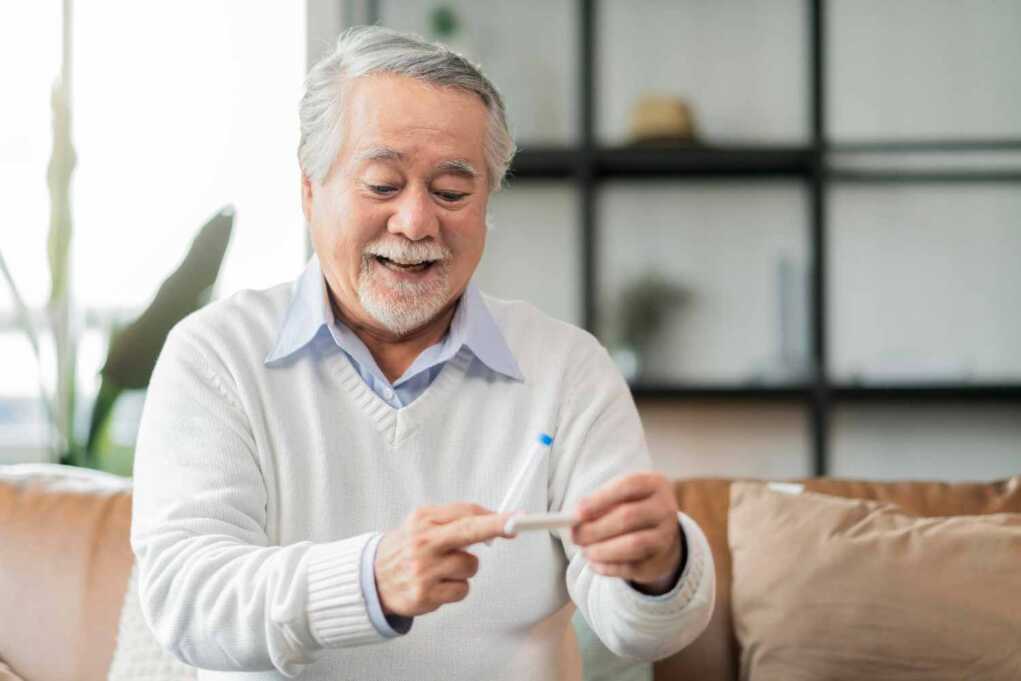
Claims of cures for diabetes run rampant on the internet. There are those who say cinnamon will cure your blood sugar woes, promises that avocado will restore the body’s ability to process glucose, and more. But is diabetes reversible?
The truth is that those quick fixes are bogus—and a “cure” isn’t what you should be looking for anyway. Rather, experts say you can go into “remission” with some types of diabetes (but it requires more than an avocado a day!).
You may have heard the word “reversal” used with regard to diabetes, but this implies that a patient’s efforts stop once they reach their goals, says Leon I. Igel, M.D., F.A.C.P., F.T.O.S., D.A.B.O.M., an obesity expert, an endocrinologist, chief medical officer for Intellihealth
an obesity expert, an endocrinologist, chief medical officer for Intellihealth, and a clinical assistant professor of medicine at Weill Cornell Medicine. In fact, patients still need to keep up regular doctor visits and maintain the lifestyle changes that have helped them. “ ‘Diabetes reversal’ does not consider the chronic and often progressive nature of diabetes,” Dr. Igel says. That’s why the term now preferred by the American Diabetes Association (ADA) is “remission.”
Whether your diabetes can go into remission depends first on which type your doctor says you have. That diagnosis comes after a hemoglobin A1c test, a blood test that assesses average blood glucose, or sugar, over the past three months. Testing for the body’s ability to produce adequate insulin (as well as testing for the presence of pancreatic autoantibodies) also may be necessary. These results will determine the course of action (and treatment) your doctor recommends.
So will your diabetes diagnosis stick, or can you do anything to bring it into remission? Here’s what to know for the most common types.
Is Prediabetes Reversible?
Can it go into remission? Yes—usually.
Two issues need to be addressed. People with prediabetes experience impaired insulin release and insulin resistance, explains Priya Jaisinghani, M.D., an endocrinologist at NYU Langone Health. These conditions lead to rising blood sugar, so reaching remission means improving both.
How to do it: Opting for a nutritious diet and upping exercise may lead to weight loss, which can decrease insulin resistance. Individuals living with obesity may have increased inflammation that can contribute to insulin resistance, Dr. Jaisinghani says. These lifestyle changes also may decrease certain markers of inflammation. In some cases, providers may prescribe metformin, a drug that lowers blood sugar by decreasing glucose production and increasing insulin sensitivity.
Though taking medication might mean you aren’t technically “in remission,” it can still be a valuable tool to prevent prediabetes from progressing to type 2.
Is Type 1 Diabetes Reversible?
Can it go into remission? No.
This type of diabetes is an auto-immune condition. So while there are patients who have seen short-term remission after a pancreas transplant, the vast majority of cases won’t go into remission. With type 1, insulin-producing cells in the pancreas are destroyed by the body. Because the root cause of high blood sugar comes from the body’s inability to make insulin, explains Dr. Igel, type 1 has a course of treatment that typically does not involve trying to get rid of it.
how to do it: Dr. Igel recommends connecting with an endocrinologist, who can help with carbohydrate counting, checking blood glucose levels (via a finger-stick or a continuous glucose monitoring device), prescribing and administering insulin (through injections, an insulin pump, or inhalers), and recognizing and treating hypoglycemia, or low blood sugar. With support and information, you can live a long, healthy life with type 1 diabetes. And though there is no cure, Dr. Jaisinghani says there is hope for new treatments. Lantidra, a medication recently approved by the FDA, is a first-of-its-kind cell therapy that helps restore insulin production and improve glucose levels in individuals with type 1 diabetes experiencing recurrent severe hypoglycemia. The infused cells, from deceased donor pancreatic islet cells, may secrete enough insulin so the patient no longer needs supplemental insulin to maintain normal blood sugar levels. To maintain insulin independence, the use of immunosuppressive medication is required to keep the infused islet cells alive. More research is needed, but experts like Dr. Igel consider this treatment promising.
Is Type 2 Diabetes Reversible?
Can it go into remission? Sometimes.
Medicine, lifestyle changes, and surgery can return glucose levels to normal or nearly normal in some patients. If they’re able to maintain those glucose levels three months after stopping medication therapy, their diabetes is defined as being in remission, explains Dr. Jaisinghani. But that’s not always feasible, nor is it easy.
How to do it: Taking medications like metformin may put those with type 2 diabetes on a path toward remission. Dr. Igel says medication can help improve blood sugar; some kinds may make weight loss easier to achieve as well, which can aid in overcoming insulin resistance. Another treatment option gaining popularity is a class of medications called GLP-1 (glucagon-like peptide 1) agonists. Ozempic is the most widely known of these; it’s a weekly subcutaneous injection that lowers blood sugar levels by stimulating the body to produce more insulin when glucose levels are high. It also delays gastric emptying so you feel full sooner after eating and maintain that sense of fullness longer after a meal. This secondary mechanism of action not only improves glucose levels but may lead to weight loss as well.
Weight loss can lessen insulin resistance, Dr. Jaisinghani says. For those with obesity, she adds, bariatric surgery has been shown to improve insulin sensitivity and some function of insulin-producing cells. As with prediabetes, nutrition and exercise can also aid in weight loss, which in turn can decrease insulin resistance. Even if you don’t achieve type 2 diabetes remission, the steps you take to manage diabetes will pay off in a longer and better-quality life.
Important Notice: This article was originally published at www.prevention.com by Emily Goldman where all credits are due.
Disclaimer
The watching, interacting, and participation of any kind with anything on this page does not constitute or initiate a doctor-patient relationship with Dr. Farrah™. None of the statements here have been evaluated by the Food and Drug Administration (FDA). The products of Dr. Farrah™ are not intended to diagnose, treat, cure, or prevent any disease. The information being provided should only be considered for education and entertainment purposes only. If you feel that anything you see or hear may be of value to you on this page or on any other medium of any kind associated with, showing, or quoting anything relating to Dr. Farrah™ in any way at any time, you are encouraged to and agree to consult with a licensed healthcare professional in your area to discuss it. If you feel that you’re having a healthcare emergency, seek medical attention immediately. The views expressed here are simply either the views and opinions of Dr. Farrah™ or others appearing and are protected under the first amendment.
Dr. Farrah™ is a highly experienced Licensed Medical Doctor certified in evidence-based clinical nutrition, not some enthusiast, formulator, or medium promoting the wild and unrestrained use of nutrition products for health issues without clinical experience and scientific evidence of therapeutic benefit. Dr. Farrah™ has personally and keenly studied everything she recommends, and more importantly, she’s closely observed the reactions and results in a clinical setting countless times over the course of her career involving the treatment of over 150,000 patients.
Dr. Farrah™ promotes evidence-based natural approaches to health, which means integrating her individual scientific and clinical expertise with the best available external clinical evidence from systematic research. By individual clinical expertise, I refer to the proficiency and judgment that individual clinicians acquire through clinical experience and clinical practice.
Dr. Farrah™ does not make any representation or warranties with respect to the accuracy, applicability, fitness, or completeness of any multimedia content provided. Dr. Farrah™ does not warrant the performance, effectiveness, or applicability of any sites listed, linked, or referenced to, in, or by any multimedia content.
To be clear, the multimedia content is not intended to be a substitute for professional medical advice, diagnosis, or treatment. Always seek the advice of your physician or other qualified health providers with any questions you may have regarding a medical condition. Never disregard professional medical advice or delay in seeking it because of something you have read or seen in any website, video, image, or media of any kind. Dr. Farrah™ hereby disclaims any and all liability to any party for any direct, indirect, implied, punitive, special, incidental, or other consequential damages arising directly or indirectly from any use of the content, which is provided as is, and without warranties.

